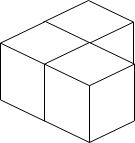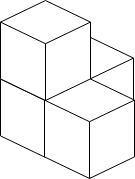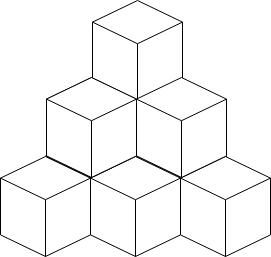LeetCode-in-Java
1739. Building Boxes
Hard
You have a cubic storeroom where the width, length, and height of the room are all equal to n units. You are asked to place n boxes in this room where each box is a cube of unit side length. There are however some rules to placing the boxes:
- You can place the boxes anywhere on the floor.
- If box
xis placed on top of the boxy, then each side of the four vertical sides of the boxymust either be adjacent to another box or to a wall.
Given an integer n, return the minimum possible number of boxes touching the floor.
Example 1:

Input: n = 3
Output: 3
Explanation: The figure above is for the placement of the three boxes. These boxes are placed in the corner of the room, where the corner is on the left side.
Example 2:

Input: n = 4
Output: 3
Explanation: The figure above is for the placement of the four boxes. These boxes are placed in the corner of the room, where the corner is on the left side.
Example 3:

Input: n = 10
Output: 6
Explanation: The figure above is for the placement of the ten boxes. These boxes are placed in the corner of the room, where the corner is on the back side.
Constraints:
1 <= n <= 109
Solution
public class Solution {
static final double ONE_THIRD = 1.0d / 3.0d;
public int minimumBoxes(int n) {
int k = findLargestTetrahedralNotGreaterThan(n);
int used = tetrahedral(k);
int floor = triangular(k);
int unused = (n - used);
if (unused == 0) {
return floor;
}
int r = findSmallestTriangularNotLessThan(unused);
return (floor + r);
}
private int findLargestTetrahedralNotGreaterThan(int te) {
int a = (int) Math.ceil(Math.pow(product(6, te), ONE_THIRD));
while (tetrahedral(a) > te) {
a--;
}
return a;
}
private int findSmallestTriangularNotLessThan(int t) {
int a = -1 + (int) Math.floor(Math.sqrt(product(t, 2)));
while (triangular(a) < t) {
a++;
}
return a;
}
private int tetrahedral(int a) {
return (int) ratio(product(a, a + 1, a + 2), 6);
}
private int triangular(int a) {
return (int) ratio(product(a, a + 1), 2);
}
private long product(long... vals) {
long product = 1L;
for (long val : vals) {
product *= val;
}
return product;
}
private long ratio(long a, long b) {
return (a / b);
}
}

